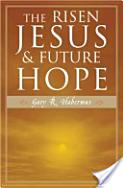Most modern Americans associate the theory of evolution with the publication of On the Origin of the Species by Charles Darwin, in 1859. In reality, many nontheists prior to Darwin believed the universe was eternal or uncaused. Darwin's pivotal contribution was the notion of natural selection, which provided a mechanism to make evolution work beginning with matter alone. According to Darwin, life began as the result of chemical relations in a "warm little pool."(1) Over time, through the process of natural selection, new life forms evolved as organisms adapted new characteristics to meet the challenges of their changing environment. Darwin appealed to the fossil record to prove his theory that species that adapted survived while those who did not passed into extinction.
For Bible believers this naturalistic explanation for the origin of life does not pass the scrutiny of Scripture for a number of reasons. Adam was created as a fully functioning adult male made in the image and likeness of God. Moreover, Genesis one reports that the myriad of life observable in the biosphere was created in fully developed adult form and reproduced after their own kind. Lastly, the Bible is explicitly clear that God alone is responsible for the complex design of the crated order:
- Genesis 1:1—"In the beginning God created the heaven and the earth."
- John 1:1-3—"In the beginning was the Word, and the Word was with God, and the Word was God. 2) The same was in the beginning with God. 3) All things were made by him; and without him was not any thing made that was made."
The observant reader will notice how God's word clearly teaches that the universe is not eternal since it did not exit before God created it. Consequently, at every turn the Bible stands against the unproven theoretical suppositions of evolutionary theory.
Unfortunately, the prevailing thought in modern culture is that something is only true if it can be proven scientifically. In fact, many suppose that science alone is the only source for truth in modern life. This thinking is that if something cannot be subjected to intense scientific experimentation then it is not true. Statements such as, "science is the only source of objective truth" claims to be an objective truth, but it's not a scientific truth.(2) Believers should never allow themselves to be deceived by this sort of philosophical "tomfoolery." How can science be the only source of truth when statements such as this cannot be scientifically proven? In short, the statement is philosophical in nature—it can't be proven by science—therefore it defeats itself.(3)
The verses quoted above speak of "the beginning" of which God was the cause. Consequently, it is impossible for the universe to be eternal since everything that has a beginning has a cause. In this case, the eternal God is the originator of time and life. Obviously, these Scriptural realities stand in direct opposition to modern teaching on evolution. While the Bible has sufficient basis to reject evolution simply because it is repeatedly repudiated by the Scriptures, even those how disbelieve the Bible should reject evolution since there is abundant scientific evidence to disprove it.
This reality can be seen by comparing two different types of science, origin science and operation science. "All science is based on the notion of causality, every event has a cause."(4) Since things don't happen willy-nilly, even if we do not know the specific cause of some event, we can surmise what kind of cause it must have been because of the kinds of effects we see today. "The idea that whatever caused some effect in the past will cause the same effect in the present is called the principle of uniformity. All science is based on finding cause using these two principles: causality and uniformity."(5)
During the Scientific Revolution when men such as Francis Bacon, Johannes Kepler, Isaac Newton, and William Kelvin were developing the Scientific Method, they made as distinction between primary and secondary causes.(6) "A primary cause was a first cause that explained singularities—events that only happened once and had no natural explanation."(7) In contrast, secondary causes were thought of as being natural causes and laws that govern the way things normally function.(8) Just as it is wrong for supernaturalists to explain ordinary events such as earthquakes, tornados, and hurricanes using primary causes, it is also wrong for the naturalists to explain all singularities by natural causes.(9)
The result of distinguishing between primary and secondary causes has led to the development of two different types of science: origin science (forensic) and operation science (empirical).(10) Operation science deals with the way things normally operate; it studies things that happen over and over again in a regular and repeated way.(11) "Operation science seeks answers that are testable by repeating the experiment over and over, and falsifiable if the cause does not always yield the same effect."(12) For this reason, operation science seeks out natural (secondary) causes for the events it studies. This repeatability allows the scientist to project the outcome of future experiments.
Despite naturalistic claims to the contrary, origin science is not just another name used by those who teach creationism. Rather it is an entirely different kind of since. Dr. Norman Geisler, author of When Skeptics Ask, offers the following definition of origin science:
Origin science studies past singularities, rather then present normalities. It looks at how things began, not how they work. It studies things that only happened once, and by their nature, don't happen again. It is a different type of study that requires a difference approach. Rather than being an empirical science like physical or biology, it is more like a forensic science.(13)
The hit television show, CSI, is an example of origin science in action. A person's death is a singular event, meaning it cannot be reproduced through experimentation in a laboratory. Therefore, the detectives and medical examiners on CSI investigate a past singularity (a person's death) by examining the effect and than deducing what could have caused that event.
Mechanically, origin science works on different principles than operation science. Since past events cannot be presently repeated, origin science utilizes comparisons between cause and effect relationships observable today with the effect being studied. In this fashion, a medical examiner is able to determine if someone died from natural causes or if some other cause (murder, accident) is responsible for the effect. The bottom line is this: just as operation science recognizes that some events demand intelligent causes, origin science also makes allowances for intelligent causes when the evidence calls for it.(14)
Herein lies the basic scientific argument against Evolution, namely it has taken the wrong approach. Evolutionists have applied the principles of operation since to the study of origins. Consequently, they are seeking regular and repeated causes for an event (creation) that occurred only once. Naturalists have endeavored to use the operations that are presently observable to explain how the world got here in the first place. However, in order to properly understand origins, we must use origin science, not operation science.
Next week we will consider the evidence for intelligent primary causes.
Endnotes
- Charles Darwin. On the Origin of the Species. (London: John Murray, 1859).
- Norman Geisler and Frank Turek. I Don't Have Enough Faith to be an Atheist. (Wheaton, IL: Crossway Book, 2004), 127.
- Ibid., 127.
- Norman Geisler and Ron Brooks. When Skeptics Ask: A Handbook of Christian Evidences. (Grand Rapids, MI: Baker Book, 1990), 213.
- Ibid., 213.
- Ibid., 213.
- Ibid., 214.
- Ibid., 214.
- Ibid., 214.
- Norman Geisler. Baker Encyclopedia of Christian Apologetics. (Grand Rapids, MI: Baker Books, 1999), 567.
- Geisler. Why Skeptics Ask. 214.
- Geisler. Baker Encyclopedia of Christian Apologetics, 568.
- Ibid., 568.
- Ibid., 568.


























No comments:
Post a Comment